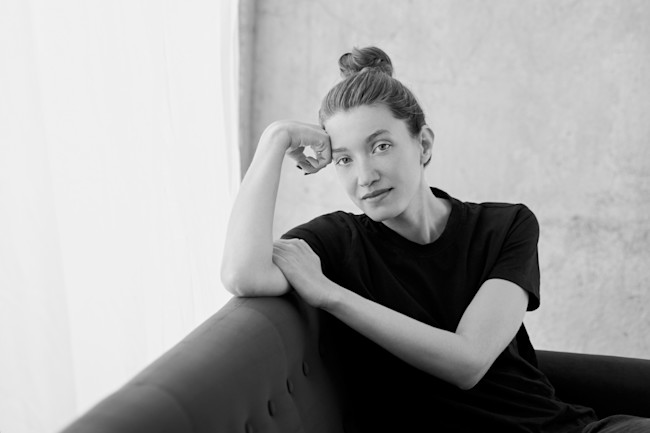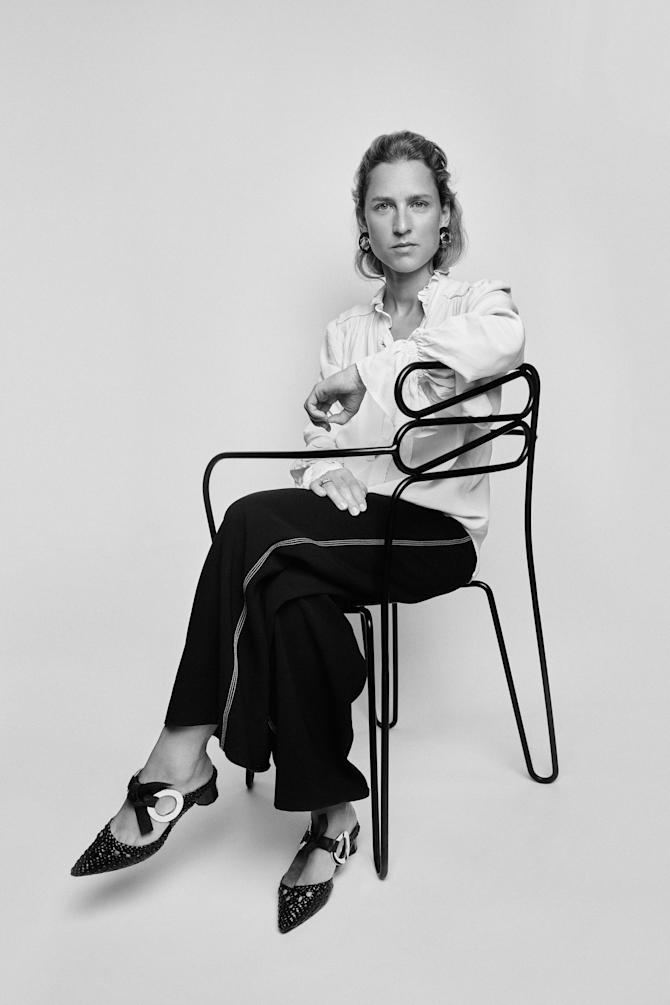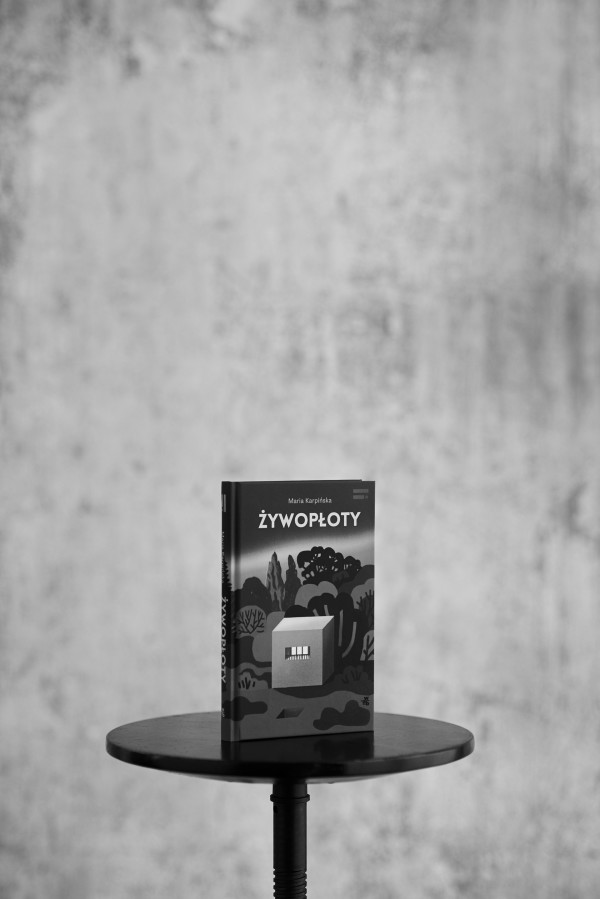Maria Karpińska

By: Maja von Horn
Photography: Jędrzej Sokołowski
Literature has always been part of her life, starting with the poetry she wrote at the tender age of five. Her debut novel, Hedges (Żywopłoty in Polish), is a modern fairy tale about what is most important in life. Not set in any particular time or space, the book tells the story of a person whose entire identity is built upon his own narration. It doesn’t exist outside of what he tells the world about himself. “I know this might not sound enticing, but it’s a book about death,” says author Maria Karpińska. “But mostly it’s a story about transience, about passing.”
Maja von Horn: You work on a book for several years, and then when it’s time for the launch, a pandemic erupts, and everyone has to go into lockdown. Book readings, events, interviews are cancelled. How did you handle it all?
Maria Karpińska: It helps to know that I’m not the only person in this situation. Everyone was affected by the lockdown, regardless of their profession, not just artists. People had much bigger problems than bad timing for a debut novel.
M.v.H.: How long did it take you to write Hedges?
M.K.: It’s hard to say how much time I spent working on the book. Some of the stories I had written earlier — three, four years ago — without thinking I’d ever publish them. Ever since my university years I’ve had the thought to show very literally the parallels between a person’s life and the structure of a book. At one point, I came up with the idea to connect the different stories by having them be narrated by the same person, whose story would show the transience of life. When I had this framework, I wrote for about a year.
M.v.H.: Every day?
M.K.: No, I can’t do that quite yet. I have a regular full-time job.
M.v.H.: What does your creative process look like? Do you walk around with a notebook and write down conversations you’ve overheard, situations you’ve observed?
M.K.: I do have a small notebook, where I write down individual phrases, sentences or longer fragments, but they aren’t usually directly related to what I see or hear. Sometimes they’ll form a longer narrative, sometimes even an entire story. I just finished one, which was a big accomplishment since it’s hard to write with a small child at home.
M.v.H.: Do you remember the moment when you thought you were ready to write fiction?
M.K.: I got a boost of confidence from two fiction workshops that I participated in before I wrote Hedges. First in Krakow, the UNESCO City of Literature Creative Writing Course, and then these amazing workshops organized by the [Polish] publishing house Czarne. That’s where I first had to read my writing out loud and subject it to the opinions of others. I think that was when I first realized that I have what it takes to do this, that the short forms I’d written could form a larger narrative.
The two experiences were very different. The workshops in Krakow were not only about the creative aspect of writing, but also included meeting a lawyer to learn about getting book deals, or a session with a PR specialist who told us what promoting a book looks like. On the other hand, the workshops organized by Czarne were held in the mountains, where the publishers, Monika Sznajderman and Andrzej Stasiuk, live. It was an amazing adventure — the mountains, a house in the middle of nowhere, small groups. Showing your work to people is stressful, but very constructive and necessary, especially when you’re just starting out.
M.v.H.: Once you were done with the workshops, did you feel like you were good enough to be a writer?
M.K.: No, I don’t know if I feel that I’m good enough — I don’t think I am. But the workshops confirmed for me that writing is what I want to do, and that this was finally the time to do it.

M.v.H.: You graduated from the liberal arts program at the University of Warsaw. What made you decide to do that?
M.K.: My academic concentration was the civilization of the Mediterranean, and my studies encompassed everything that had to do with the region. It’s an interdisciplinary humanities program, where you can choose most of your classes. I mostly picked literature ones. I didn’t want to study Polish philology, because I associated it mostly with learning grammar, and I wasn’t interested in that. I wanted to be able to read a lot and travel. The department gave me that ability — I did several study abroad programs in Italy, and my academic research focused on Italian literature. I wrote my Master’s thesis about death in the works of Dino Buzzati, who I think is one of my favorite writers.
M.v.H.: The motif of transience shows up in everything you write. It seems like you are constantly trying to become accustomed to death. Why do you, as a young woman, find the need to do that?
M.K.: I think it’s very deep within me and I’d probably need many years of therapy to be able to answer that question. I do have this need to keep coming back to the subject. They say that a writer keeps writing the same book, so maybe this is the book that I will always be writing. I noticed a paradox, however — the more I write about death, the more life becomes the actual theme of my writing. There’s something comforting about that.
M.v.H.: I heard that even back in your university years you liked to write about death and illness in literature.
M.K.: I don’t know if “liked” is the right word, but it’s true. My parents even started to worry about me. I believe that in some way, all books speak about death. Art and literature exist so that we can try to describe something that seems indescribable, so that we can try to get used to the transience of life. That’s why I think that even if death doesn’t appear in the plot, all books speak about confronting the passage of time.
In Hedges death isn’t ostentatious, you approach it rather subtly. There are many books that relish in death. They describe cruelty, war, illness, approaching dying in a very naturalistic way. My writing is far from that, I’m not interested in that aspect of death. To me it’s a literary motif that I feel the need to explore, without oozing sadness.
M.v.H.: Is it a need to normalize death?
M.K.: Normalize death? I think so. The need to get used to death as something normal.
Death is still a taboo subject. We don’t talk about it much, which makes it hard to think of as something normal.
[Philosopher] Zygmunt Bauman wrote frequently about this. On the one hand, death surrounds us in today’s times — it’s ubiquitous in the media, in pop culture. And in that sense it’s been stripped of taboo. On the other hand, that pervasiveness doesn’t translate to getting accustomed to death in everyday life. It’s hard to normalize the subject, I struggle with this myself. In the past, death was a part of life, something that we knew well, because it was always somewhere close. We don’t have that anymore. Today death has been pushed into the realm of hospitals and hospices.
M.v.H.: Don’t you think some societies are better than others at familiarizing themselves with death?
M.K.: Yes, in Western culture there is no clear prescription for what to do when a loved one dies. There’s no ritual that helps with this situation, that makes mourning easier. Everyone has to find their own way. Once, culture gave us useful solutions — how long should one be in mourning, how a community is supposed to behave in relation to the person who lost a loved one, how to act in relation to someone gravely ill. We don’t have that anymore. I think it’s even harder for people who are not religious — they can’t turn to the answers that religion can offer. I notice what culture gives us and what it deprives us of — and death is not a sphere that it’s made easier for anyone. But I’m not one to judge whether that’s good or not. Maybe thanks to that we got the freedom to cope in a more individual way.
“Art and literature exist so that we can try to describe something that seems indescribable, so that we can try to get used to the transience of life.”
M.v.H.: You start Hedges with a monologue, in which the narrator introduces himself as a writer for hire. Is this a story from little Maria’s life?
M.K.: Not exactly. There are several micro-situations that happened to me, but there aren’t many related directly to my life.
M.v.H.: Is that why the hero is a man?
M.K.: A clear boundary between me and my hero lets me write. But while writing, I don’t think about whether I’m telling the story of a man. I’m telling the story of a human. The experience of time, of transience, is independent of gender. I’m writing about myself in that I’m presenting my feelings — I wouldn’t know how to do this otherwise. Everything that my characters are going through I go through as well, but more on an emotional level rather than a literal one. It’s not about specific events.
M.v.H.: I read Hedges as a novel, but many people see it as a collection of stories.
M.K.: While writing, I thought about Hedges as one fragmented narrative connected by the narrator. But after a book gets published it lives a life of its own and everyone can receive it in their own way. My intention is not as important.
M.v.H.: Your language — sensitive, funny, melancholic — is surely partly influenced by what you’re reading. Who are your favorite authors?
M.K.: I read a lot, probably like anyone who writes. Because of my day job as an editor of a literary magazine, I largely read new releases, foreign literature. One of my favorite writers who also influences my style is Romain Gary, a French author with Lithuanian-Polish roots. Many of his books are also narrated in the first person by a male narrator. I also like Italian writers, like the aforementioned Buzzati, but also Italo Calvino and Italo Svevo, whose beautiful book Zeno’s Conscience made a huge impression on me. In terms of contemporary writers I love the American writer Sigrid Nunez. I just wrote a piece about her.
M.v.H.: The way that you experiment with form, with different types of narration — is that a function of being a debut writer? A way to show off your abilities?
M.K.: While I was in the process of writing Hedges, I didn’t yet know that it would be published, that it would become my debut, but yes, I do like to play with form. Toward the end of my university years I started to study the theory of narration. I was particularly interested by scholars who find connections between the time span of a human life and the time of a novel. Hedges are thus the result of this fascination rather than a need to prove my abilities. The book is a rather literal interpretation of an idea that fascinated me in my academic research.
M.v.H.: Your style has been compared to the style of Gombrowicz, Pavel, Hrabal. Do you feel any pressure to live up to those comparisons?
M.K.: No one is comparing their craft with mine, that would be an enormous exaggeration. But maybe the comparisons come from the fact that it’s easier to describe my book by comparing it to Czech fiction, rather than describing its muddy plot. I’d never reference Gombrowicz in my own context, but as I said earlier, when a book hits the store shelves, it starts living its own life.
M.v.H.: Were you a bookworm as a child, reading under the covers with a flashlight?
M.K.: I learned how to read when I was five or six years old, before I went to school. The first book I read on my own was All About the Bullerby Children, which I read nine times in a row. I was very scared of reaching for a different book, because I didn’t know what I’d find inside. I like bringing up this family story because it demonstrates the power of literature, that a fictional world can evoke such strong emotions.
M.v.H.: Did you write something as a child?
M.K.: Yes! My actual debut was two poetry collections that I published when I was five years old. My parents typed them up on our first computer, printed them, and bound them in covers held together by string. Both had a print of two copies. My parents got one, my grandparents the other. My grandparents have theirs to this day. When I was younger, I dreamt of becoming a poet. My favorite authors were Szymborska and Father Twardowski. At summer camp kids would make fun of me mercilessly for bringing my poetry with me. Bad idea. When you’re seven or eight, it doesn’t help you make any friends. I wouldn’t recommend it.

M.v.H.: Did you feel lonely?
M.K.: I don’t think so, but I was also divorced from reality, and definitely oversensitive, a trait that plagues me to this day.
M.v.H.: Did your parents interfere in your reading choices?
M.K.: No, but they gave me suggestions. My dad has a very large library, and he never had to force me or my sister to read. Reading for me was something natural, probably because I always saw my parents with a book. Before leaving on family vacations, my dad would take me to his library and advise which book I should bring with me. It was a very nice ritual: he’d ponder whether I was old enough for this or that book, or whether it was too early. As a teenager he’d give me specially selected books for that stage of my life. I got to know the classics of literature in this very organized way.
M.v.H.: Your dad is a screenwriter, did you ever think of writing screenplays?
M.K.: No, I think it’s very difficult. Fiction gives you more freedom. A screenplay has to adhere to specific rules — while writing you have to immediately think about how to translate each scene into the language of film, into image. I’m not that strong visually, I prefer dealing in words. I feel like writing fiction and writing screenplays require completely different skills.
M.v.H.: Is being a writer a good profession nowadays?
M.K.: Looking at it from a purely financial perspective, it’s definitely a bad time to be a writer. I can’t afford to write full time, and I don’t think that will change for a while. But I knew it would be that way and I decided to do it with full awareness of the situation.
M.v.H.: Why do you think that is?
M.K.: I’m no expert on the publishing market in Poland, so I can only speak from intuition, and based on what we all kind of know: Poles read far to little, the statistics are dire.
M.v.H.: What should happen in Poland for that to change? For reading to become a way in which you spend your free time?
M.K.: We need thoughtful systemic solutions that change both the situation of writers and readers — from education to something as simple as the price of books. Scandinavian countries are a good example to emulate. They have many programs for writers and readers, which helped build a culture of reading.
M.v.H.: Maybe the pandemic is a good time for an increase in readership?
M.K.: On the one hand — that could be the case. When my book came out on the eve of the lockdown, many people would cheer me up by telling me that Poles are sitting at home and reading. Books are a reliable antidote to stress related to the increasingly overwhelming situation around us. I think that escapism in all its forms is popular. I don’t know if I could get by without books. On the other hand though, the economic crisis will surely depress many areas of culture, and I’m afraid it will hurt literature as well.
Maria’s favorite books by Italian authors
- “Zeno Cosini”, Italo Svevo
- “The Tartar Steppe”, Dino Buzzati
- “Lezioni americane”, Italo Calvino
- “Sessanta racconti”, Dino Buzzati
- “Six Walks in the Fictional Woods”, Umberto Eco

